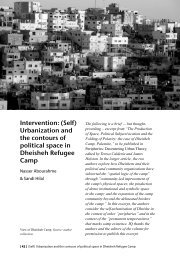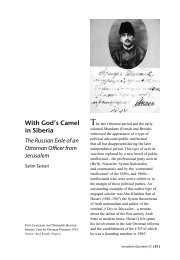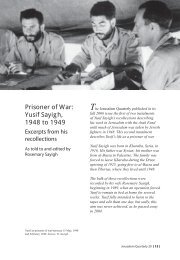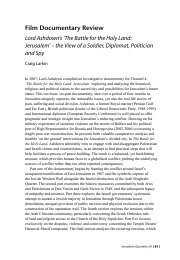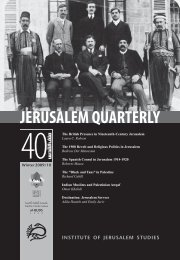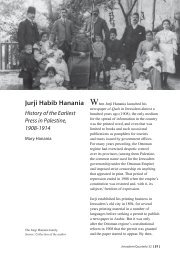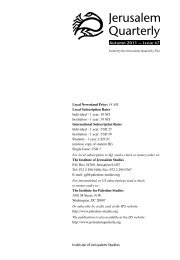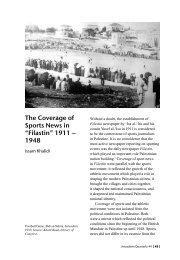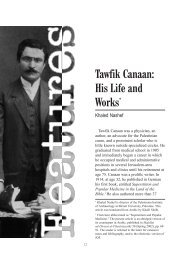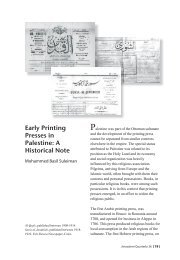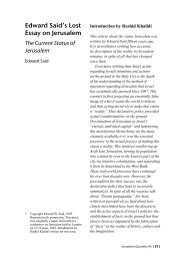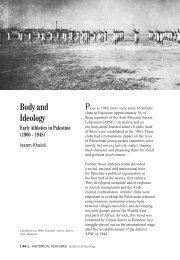PLUNDERING PALESTINE - Jerusalem Quarterly
PLUNDERING PALESTINE - Jerusalem Quarterly
PLUNDERING PALESTINE - Jerusalem Quarterly
Create successful ePaper yourself
Turn your PDF publications into a flip-book with our unique Google optimized e-Paper software.
19<br />
I recently had the opportunity to speak with two<br />
of them, Aziz Shihadeh, an attorney from Nazareth<br />
who worked at the library from 1963 to 1966, and<br />
Butrous Abu Manneh, a professor of Middle Eastern<br />
history at the University of Haifa, who worked at the<br />
library from 1956 to 1958. Shihadeh told me of:<br />
big sacks of flour containing books. We knew<br />
that these were books of Arabs from 1948. The<br />
sacks were put behind the department’s reading<br />
hall. We would get dozens of sacks, sometimes<br />
even a hundred, and catalog them.<br />
GA: Did this bother you?<br />
AS: No, at that time it did not bother me. The<br />
person is more important than the book. If the<br />
people have been exiled and dispersed across<br />
the world, what good does the book do? It’s good<br />
the books were not burned. There are people who<br />
would have burned them.<br />
GA: Why do you think the books were not<br />
burned?<br />
AS: The Jews appreciate the book. They are a<br />
civilized people. They are not barbarians. And<br />
besides, had the books been left to the street<br />
children, they would have ransacked or destroyed<br />
them. People in the street would not have<br />
valued these books. (Aziz Shihadeh, meeting in<br />
Nazareth, 28 Feb., 2007)<br />
Abu Manneh told me similar things: “I appreciate the<br />
initiative to bring together and preserve these books.<br />
This really is a civilized act – or else the books would<br />
have been lost. I’m sure that the act was sincere and<br />
based on the notion that at stake were cultural assets<br />
that should be preserved. The people of the library<br />
were decent.” (Butrous Abu Manneh, meeting in<br />
Haifa, 14 March, 2007)<br />
20<br />
In this context, and in the current stage of my<br />
work, I cannot help but think about the fact of my<br />
being an Israeli. I thought about it when I met with<br />
Knesset Member Jamal Zahalka, who approached the<br />
National Library several years ago with a request to<br />
return Khalil al-Sakakini’s books, a request which<br />
was answered with the following reply: “We are<br />
unable to discuss your request until the list of books<br />
is handed to us.” (Needless to say that such a list<br />
could have only existed in the hands of the National<br />
Library.) Zahalka was courteous and tried his best<br />
to assist me. However, and for no apparent reason, I<br />
could not help but feel that he was looking me over<br />
with suspicion and that his tone was tinged with irony<br />
towards me, a somewhat questionable interviewer,<br />
seeking to speak on behalf of those whose voice<br />
had been taken from them, and at the same time a<br />
descendent of the disinheritors.<br />
21<br />
NLA, 793/200. A last note: this study owes its<br />
existence to archives. Two things occur to me in this<br />
context. First, the gap between the chaos of war, at<br />
least as it is usually conceived, and the methodical<br />
nature of documentation. I am convinced that there<br />
are many things of which nothing has been said,<br />
and of which nothing remains: undocumented<br />
conversations, letters that were lost forever, oral<br />
agreements and operations that went unmentioned.<br />
However, I cannot but be impressed by the plentiful<br />
documents kept in the archives, which I believe reveal<br />
more than just the mechanism of administration.<br />
Secondly, much has been said about the power of<br />
the archive, its incessant aggression and the varied<br />
ways in which it serves the regime. All this is true,<br />
but still, archives may also undermine the same order<br />
on whose behalf they are supposed to function. These<br />
spaces, which zealously preserve the incriminating<br />
testimonies and the evidence that might, some day,<br />
indict their owners, could undermine teleological<br />
narratives which unravel in a seemingly undisturbed<br />
manner. Because it is the documents, so zealously<br />
kept, which expose the breaks, the rifts, the cuts and<br />
the transformations that imperial history seeks to<br />
hide. By preserving remnants and partial, incomplete<br />
objects, archives have the power to act against<br />
imperial history and at the same time lead us towards<br />
more fragile, uncertain dimensions.<br />
22<br />
It seems that since then, this version of events has<br />
become fixed in the National Library’s consciousness.<br />
In an exhibition that was held in 1965 marking 40<br />
years since the Hebrew University’s inception, the<br />
1948 war was given a place of honor. However,<br />
the book affair was summed up very simply in<br />
the catalog: “During the Liberation War, many<br />
abandoned Arab books were found.” (The National<br />
Library, An Exhibition Marking 40 Years Since the<br />
Hebrew University’s Foundation (<strong>Jerusalem</strong>: The<br />
National Library and the Hebrew University, 1965)<br />
36).<br />
23<br />
SA, GL-1429/3.<br />
[ 20 ] FEATURES Ownerless Objects?



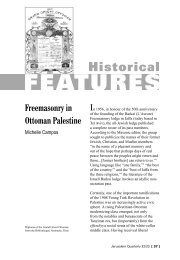
![In Search of Jerusalem Airport [pdf] - Jerusalem Quarterly](https://img.yumpu.com/49007736/1/180x260/in-search-of-jerusalem-airport-pdf-jerusalem-quarterly.jpg?quality=85)
